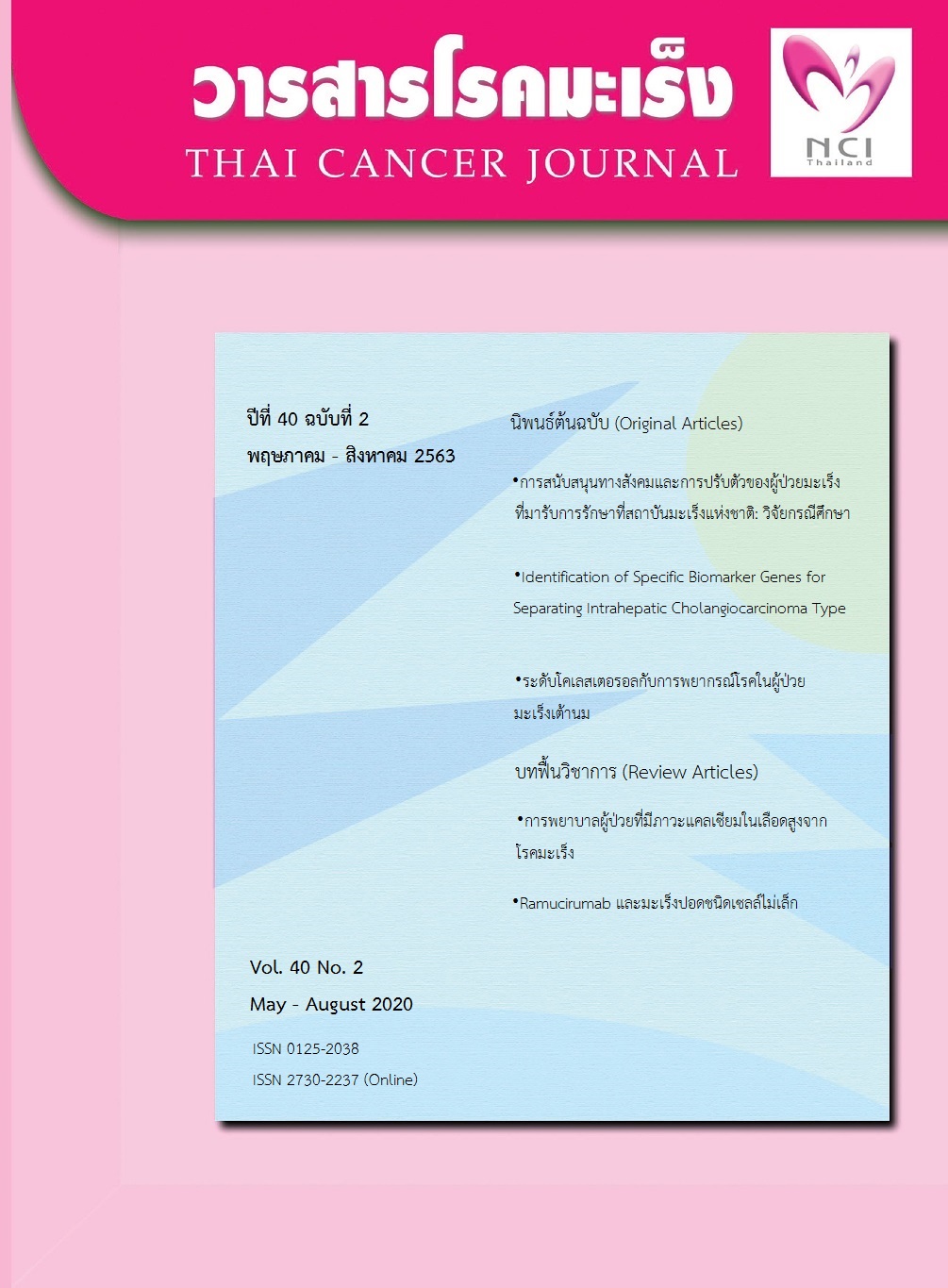Ramucirumab in Non-small Cell Lung Cancer
Keywords:
ramucirumab non-small cell lung cancer VEGFR-2Abstract
Lung cancer is one of the most prevalent and serious public-health problems in many countries, including Thailand. Non-Small Cell Lung Cancer (NSCLC) is the most common type of lung cancer. Smoking is the most significant risk factor for lung cancer. Ramucirumab is a fully human IgG1 monoclonal antibody, which specifically prevents binding between VEGF and VEGFR-2. This interaction inhibits the formation of new blood vessels that support the growth of cancer. The standard treatment is 10 mg/kg of ramucirumab every 2 weeks, together with 150 mg/day erlotinib or 75 mg/m2 docetaxel every 21-day cycle. Patients are treated until disease progresses or drug toxicity becomes unacceptable. The most serious adverse events are gastrointestinal perforation, severe gastrointestinal hemorrhage, and arterial thromboembolic events. The most common adverse drug reactions include neutropenia, fatigue/asthenia, leukopenia, epistaxis, and diarrhea. Mucositis is not necessarily involved. Ramucirumab dosage should be adjusted for patients with impaired renal and hepatic function. Age, gender, ethnicity, body weight, and blood albumin level have no effect on the metabolism of ramucirumab (Thai Cancer J 2020;40:107-118)
References
Bray F, Ferlay J, Soerjomataram I, Siegel R, Torre LA, Jemal A. Global cancer statistics 2018:GLOBO
CAN estimates of incidence and mortality worldwide for 36 cancers in 185 countries. CA Cancer J Clin 2018;68:394–424.
หน่วยงานทะเบียนมะเร็ง. ทะเบียนมะเร็งระดับโรงพยาบาล พ.ศ. 2561. กรุงเทพมหานคร: กลุ่มงานเทคโนโลยีสารสนเทศ สถาบันมะเร็งแห่งชาติ; 2562.
NCCN guidelines for patients® Lung cancer screening 2020. Available from: https://www.nccn.
org/patients/guidelines/content/PDF/lung_screening-patient.pdf. Accessed May 8, 2020.
Omenn GS, Merchant J, Boatman E, Dement JM, Kuschner M, Nicholson W, et al. Contribution of environmental fibers to respiratory cancer. Environ Health Perspect 1986;70:51-6.
Travis WD, Brambilla E, Nicholson AG, Yatabe Y, Austin JHM, Beasley MB, et al. The 2015 World Health Organization Classification of Lung Tumors: Impact of Genetic, Clinical and Radiologic Advances Since the 2004 Classification. J Thorac Oncol. 2015;10:1243-60.
ดังชีวัน ตินนังวัฒนะ.Targeted therapy in Gynecologic malignancy. Available from: https://w1.
med.cmu.ac.th/obgyn/index.php?option=com_content&view=article&id=985:targeted-therapy-in gyne
cologic-malignancy&catid=45:topic-review&Itemid=561. Accessed May 8, 2020.
Spratlin JL, Cohen RB, Eadens M, Gore L, Camidge DR, Diab S, et al. Phase I pharmacologic and biologic study of ramucirumab (IMC-1121B), a fully human immunoglobulin G1 monoclonal antibody targeting the vascular endothelial growth factor receptor-2. J Clin Oncol 2010;10:780-7
Garon EB, Ciuleanu TE, Arrieta O, Prabhash K, Syrigos KN, Goksel T, et al. Ramucirumab plus docetaxel versus placebo plus docetaxel for second-line treatment of stage IV non-small cell lung cancer after disease progression on platinum-based therapy (REVEL): a multicentre, double-blind, randomised phase 3 trial. Lancet 2014;384:665-73.
Ramucirumab. Available from https://www. drugbank.ca/drugs/DB05578. Accessed May 8, 2020.
Cyramza® (ramucirumab) [package insert] Thailand, Eli Lilly Asia Inc.,2016.
Byers LA, Heymach JV. Dual targeting of the vascular endothelial growth factor and epidermal growth factor receptor pathways: rationale and clinical applications for non-small cell lung cancer. Clin Lung Cancer 2007;8 (suppl 2):S79–85.
Nakagawa K, Garon EB, Seto T, Nishio M, Aix SP, Paz-Ares L, et al. Ramucirumab plus erlotinib in patients with untreated, EGFR-mutated, advanced non-small-cell lung cancer (RELAY): a randomised, double-blind, placebo-controlled, phase 3 trial. Lancet 2019; 20:1655-69.
Sakaguchi T, Furuya N, Ito K, Hida N, Morikawa K, Komase Y, et al. The efficacy and safety of ramucirumab plus docetaxel in older patients with advanced non‐small cell lung cancer. Thoracic Cancer 2020;11:1155-65.
Downloads
Published
Issue
Section
License
บทความทีตีพิมพ์ในวารสารโรคมะเร็งนี้ถือว่าเป็นลิขสิทธิ์ของมูลนิธิสถาบันมะเร็งแห่งชาติ และผลงานวิชาการหรือวิจัยของคณะผู้เขียน ไม่ใช่ความคิดเห็นของบรรณาธิการหรือผู้จัดทํา







